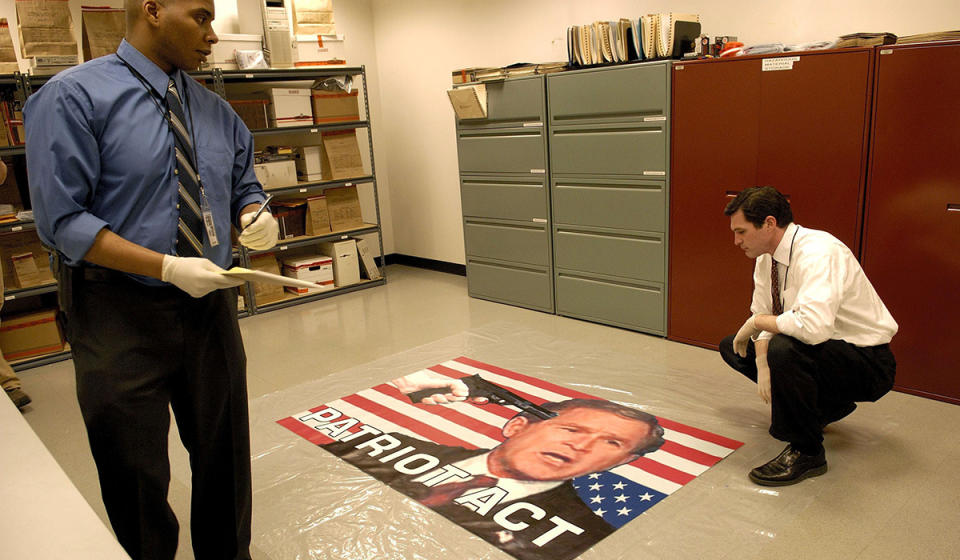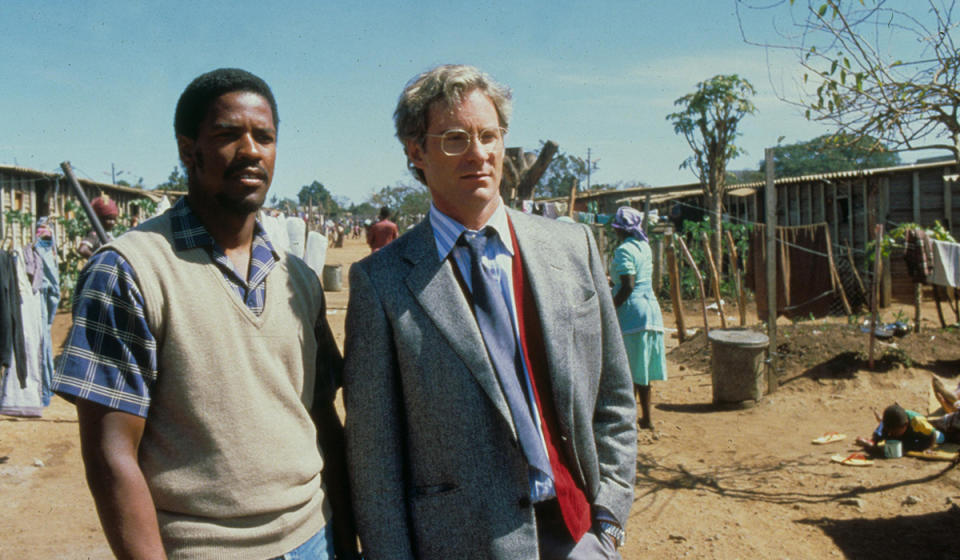10 movies that caused diplomatic incidents worldwide
Movies have the power to inspire and to unite but they also have the power to outrage. Every so often, a firebrand film comes along that ignites controversy across borders: here are 10 movies that caused frayed international relations…
‘Zoolander’ (2001)
Caused a stink in: Malaysia

Ben Stiller’s fashion pastiche had the bad luck to be released in the US two weeks after 9/11; it contained a bizarre plot point about the proposed assassination of the Malaysian Prime Minister by a brainwashed male model that we’re sure seemed harmless, pre-September 11th. In a post 9/11 world, however, it was considered “definitely unsuitable” - not our words, you understand, but those of Malaysia’s own censorship board. The movie was never shown in Malaysia, nor in neighbouring Singapore, due to cultural sensitivities; interestingly, when released throughout the rest of Asia, all mentions of Malaysia were replaced with Micronesia, the small Oceanic island cluster that Hansel mistakes for Malaysia.
Borat (2006)
Caused a stink in: Kazakhstan

Sacha Baron Cohen has never been one to shy away from controversy, instead deciding to embrace it like an old friend. When small-screen creation Borat made the leap to the big screen, he put his home nation of Kazakhstan on the international map – unfortunately he did so by mocking the Central Asian country (“Although Kazakhstan a glorious country, it have a problem, too: economic, social, and Jew”), incurring their wrath. The country’s Foreign Minister threatened to sue Cohen, while the Kazakh government spent millions on an advertising campaign ('Heart of Eurasia’) to change their perception. Later, when the fuss had died down and the lawsuits had been swept under the carpet, Kazakh Foreign Minister Yerzhan Kazykhanov admitted 'Borat’ had helped tourism increase tenfold and that he found some of the movie funny after all.
The Interview (2014)
Caused a stink in: North Korea

Nobody thought World War 3 would kick off as a result of a Seth Rogen movie, but that was the situation the world was facing last year, when controversial comedy 'The Interview’ – in which Rogen’s lowly journalist is tasked with assassinating North Korea’s leader Kim Jong-Un – was unveiled. Korea’s response was firm: “The United States authorities should take immediate and appropriate actions to ban the production and distribution of ['The Interview’]; otherwise it will be fully responsible for encouraging and sponsoring terrorism.” The fallout was huge: Sony pulled the film from cinemas, then found their corporate innards exposed by a gigantic leak, which the FBI claimed originated from a North Korean hacker group. This is all your fault, Rogen!
'Red Dawn’ (2012)
Caused a stink in: China

In recent years, Hollywood has looked overseas to supplement their box office income, and the Chinese market has emerged as one of the most lucrative, so big budget movies nowadays are specifically retooled to appeal to Chinese audiences. Shame no one told the makers of this 'Red Dawn’ remake, where Russia have been replaced as the 'Red menace’ by China as the aggressors invading US soil. There was uproar in the East; the China Newscorp CEO claimed the movie would exploit the audiences’s fears of the Chinese and local Asian communities refused to back the film. MGM backed down in the most cowardly way possible: by digitally replacing all Chinese flags with North Korean flags and amending the movie’s villains in post-production. They didn’t replace the Chinese actors, though. Because they all look the same, apparently.
'Death Of A President’ (2006)
Caused a stink in: The United States of America

Like some weird 9/11 truther fan-fiction, this controversial documentary imagined what the world would be like if then American President George W. Bush was assassinated while in office. It was actually a damning look at the US’s foreign policy and focused more on America’s reaction to tragedy than the grisly act itself, but it didn’t go down well in the US of A, not one bit. There were predictable calls for director Gabriel Range to be jailed, and the film was even discussed by senior American politicians. “I think it’s despicable,” said Hillary Clinton. “I think it’s absolutely outrageous. That anyone would even attempt to profit on such a horrible scenario makes me sick.”
'300’ (2006)
Caused a stink in: Iran

“Hollywood has opened a new front in the war against Iran,” blazed the headlines: it’s fair to say the Middle-eastern country didn’t take kindly to Zack Snyder’s swords 'n’ sandals epic. The portrayal of the ancient Persians as sick and twisted monsters angered many native historians, even if the movie did stick closely to the comic-book template as drawn by Frank Miller; Even the Iranian PM, Mahmoud Ahmadinejad, put the boot in, labelling '300’ “cultural and psychological warfare”. Nobody seemed to object to how mad it was that Gerard Butler played the leader of the Spartans with a Scottish accent.
'Cry Freedom’ (1987)
Caused a stink in: South Africa

Richard Attenborough’s powerful drama certainly made an impact on global culture; it may have even helped force the government’s arm in abolishing Apartheid for good. The film, about the relationship between a journalist and a black activist, was initially approved by South African censors, but officials were not best pleased by a movie that portrayed them as savage, violent, corrupt racists. Bomb threats dogged the movie upon release, perhaps even spurring the government on to action. South Africa’s Minister of Information said at the time that 'Cry Freedom’ was “crude propaganda” that would undermine his nation in the eyes of the world. Negotiations to end Apartheid began just a few short years later.
'Argo’ (2012)
Caused a stink in: Iran & Canada

Ben Affleck’s Oscar-winner caused more than its fair share of controversy; first for not giving Canada enough praise for their efforts in releasing hostages in Iran; then catching flak for having Affleck play hero Tony Mendez, who is Mexican in real life. Not to be outdone, the Iranian government objected to their portrayal in the movie. In fact, Abolhassan Banisadr, who was President of Iran during the period the movie was set, claimed most of his cabinet members were in favour of freeing the US hostages, a fact which the movie did not include. The Iranian people, however, do not agree with their ex-Prez: the movie has been one of the most popular bootleg titles on DVD in Iran; the film’s popularity is thought to be a silent protest at how current President Ahmadinejad handles international relations with the West.
'The Deer Hunter’ (1978)
Caused a stink in: The former Soviet Union

America and Russia have never been the best of friends, but during the Cold War, the nations found any excuse they could to undermine one another. Michael Cimino’s hard-hitting Vietnam War drama drew praise from the West but the former Soviet Union were having none of it; Russian news denounced the film, saying it showed “the struggle of the Vietnamese people who have earned the respect and support of the whole world”, while Soviet film festival delegates staged highly public walkouts. Fellow communist countries Cuba, Hungary, East Germany and the former Czechoslovakia all joined the Soviets in the 'Deer Hunter’ boycott.
'The Great Dictator’ (1940)
Caused a stink in: Nazi Germany

In many ways, Charlie Chaplin’s comedy 'The Great Dictator’ is one of the bravest and most dangerous movies ever made: plenty of filmmakers mock world leaders, but few do it while said despots are still in power – and even fewer when their homeland is still technically at peace with the offending nation. The iconic moustache and salute was all Chaplin needed to lampoon Hitler, replaced here by 'Adenoid Hynkel’, but Adolf didn’t see the funny side: the Fuhrer was allegedly a huge fan of Chaplin and was said to be privately heartbroken that the Tramp was mocking him to the world. The Nazi leader allegedly privately screened the movie, sent to him by Chaplin himself, twice. Well if you can’t laugh at yourself, Adolf…

 Yahoo Movies
Yahoo Movies 
